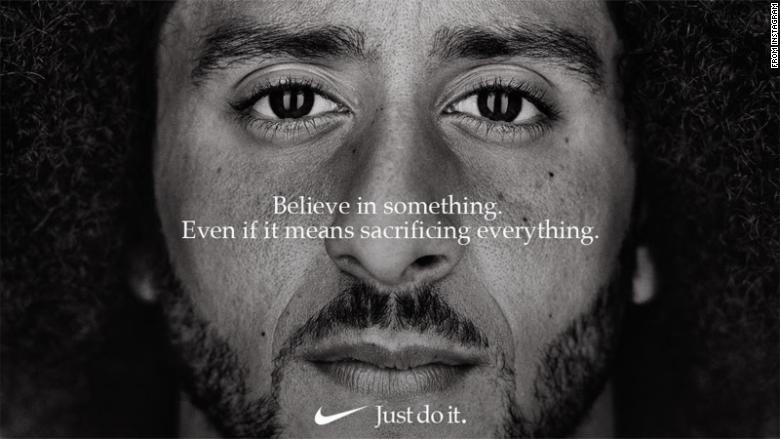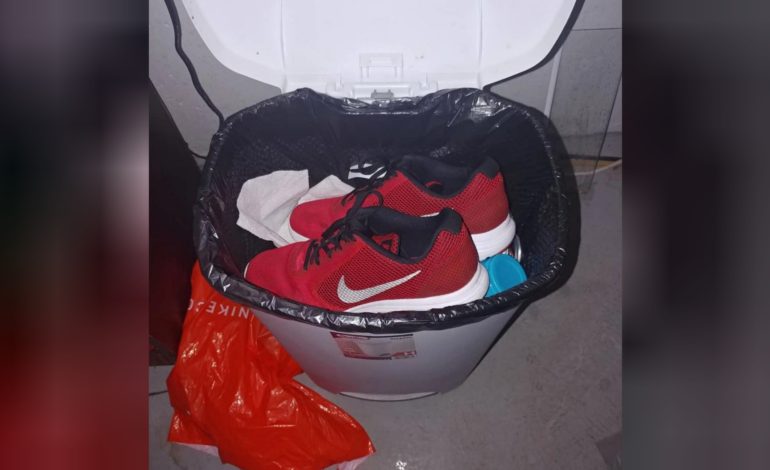Protesters on social media called for people to burn their Nike sneakers and boycott the sporting goods maker after it chose former San Francisco quarterback Colin Kaepernick, the first NFL player to kneel during the national anthem as a protest against racism, to participate in a new ad campaign.
President Trump has been critical of athletes taking a knee during the national anthem and has said he would love to see NFL owners fire football players who disrespect the American flag.
Nike is just the latest sports brand to face boycott calls, which industry analysts said can alienate some customers, while winning over others, but often blow over quickly.
“Nike is not a stranger for backing sporting personalities who take views and act on them. Politicizing sport is likely to result in polarizing demographics,” said John Guy, an analyst at Mainfirst Bank in London.
“Freedom of speech is one of America’s core tenants, so placing this freedom within a sporting context for a brand as big as Nike will always make headlines,” he added.
Under Armour faced criticism last year after its chief executive made comments supporting Trump, while Adidas drew calls in May to cut its ties to rapper Kanye West after he described slavery as a choice and praised Trump.
The customers Nike could lose will be more than made up for by attracting new younger consumers who are looking to buy brands that stand behind political topics, said Jessica Ramirez, a retail analyst with Jane Hali & Associates.
Noting the fleeting effect of calls for boycotts of Under Armour and Adidas, she added: “We don’t hear much about it today.”

Former San Francisco quarterback Colin Kaepernick appears as a face of Nike Inc advertisement marking the 30th anniversary of its “Just Do It” slogan in this image released by Nike in Beaverton, Oregon, September 4 – Courtesy Nike
TRENDING TOPIC
Over 30,000 people were tweeting with the hashtag #NikeBoycott on Tuesday morning, making it among the top trending topics on Twitter. Some posted images of themselves burning and ripping their Nike shoes and apparel.
“First the @NFL forces me to choose between my favorite sport and my country. I chose country,” Twitter user @sclancy79 said in a post retweeted 16,000 times. “Then @Nike forces me to choose between my favorite shoes and my country. Since when did the American Flag and the National Anthem become offensive?”
Others edited the ad to show images of U.S. army veterans with the same caption, criticizing Nike for signing the athlete and saying it disrespected the memory of fallen soldiers.
Still, there were a large number of other users who responded positively to Nike taking a stand on social issues.
Athletes including LeBron James, Kevin Durant, Serena Williams and Chris Paul showed support, posting images of Kaepernick’s ad on their Instagram profiles.
Even former Iranian President Mahmoud Ahmadinejad weighed in, tweeting: “The #NFL season will start this week, unfortunately once again @Kaepernick7 is not on a NFL roster. Even though he is one of the best Quarterbacks in the league.”
Core demographic?
Some analysts said the boycott would not have a big impact on Nike, which in June reported a major sales rebound in its North America business and forecast strong growth for 2019.
“The alt-right calls for a Nike boycott will fail just like the boycott of Dick’s Sporting Goods failed,” said Matt Powell, a senior adviser with market research firm NPD Group. “Old angry white guys are not a core demographic for Nike.”
Gun rights supporters called for the boycott of Dick’s Sporting Goods earlier this year after the retailer stopped selling assault rifles and high-capacity magazines following a massacre at a Florida high school in February.
Another analyst, GlobalData Retail’s Neil Saunders, said the campaign will harm Nike in middle America, where it is battling Germany’s Adidas for dominance in the sneaker market.
“The company’s stand may go down well on its native West Coast; it will be far less welcome in many other locations,” he said.
Nike, which confirmed on Monday that Kaepernick was part of the campaign and called him “one of the inspirational athletes of his generation”, did not immediately respond to requests for comment on Tuesday.






Leave a Reply